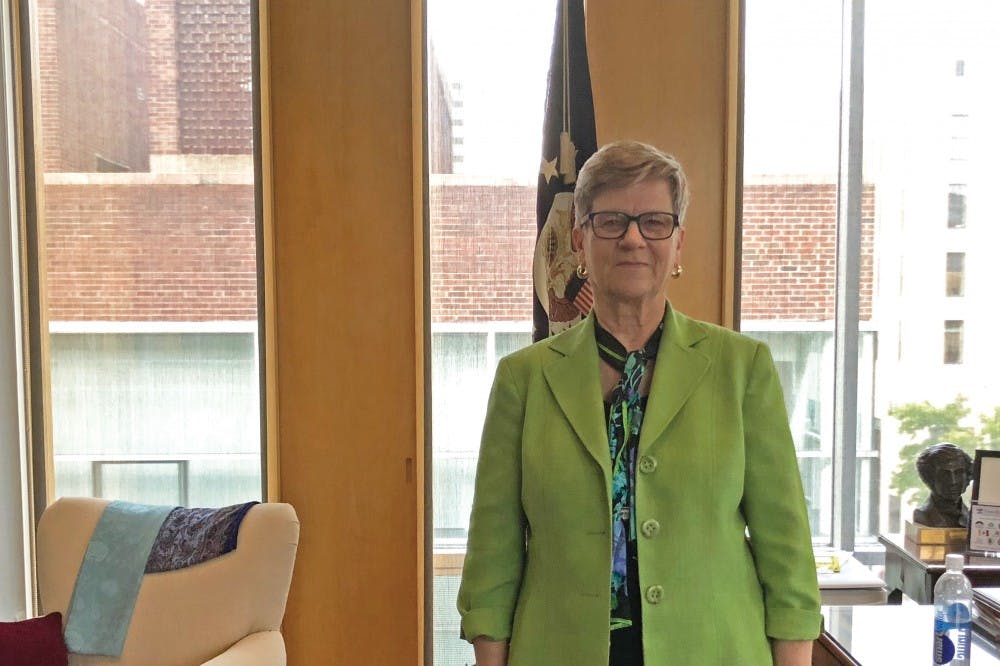Kathleen Hall Jamieson has become a pretty big deal in national politics lately.
Director of the Annenberg Public Policy Center at Penn, Jamieson has been a prominent figure on campus and in academia for some time.
Since the release of her groundbreaking new book, though, Jamieson has been profiled in the New Yorker, interviewed on CNN, and has emerged as a leading scholar on whether Russian cyberattacks contributed to the election of Donald Trump.
Even as The Daily Pennsylvanian sat down with her after a long day of meetings with members of the State Department and foreign journalists, Jamieson was notified that Hillary Clinton had just praised her new book.
Jamieson is the author of “Cyberwar: How Russian Hackers and Trolls Helped Elect a President — What We Don’t, Can’t, and Do Know,” an influential new book that provides the most in–depth look yet at what Jamieson calls Russian “subterfuge” in the 2016 presidential election.
“First, I wouldn’t call it Russian meddling — that’s a benign term and I don’t think anything they did was benign,” Jamieson said.
For her, it’s a vital distinction. When the press uses words such as “meddling” and “interfering,” it can downplay the significance of what occurred, Jamieson said.
“I want to call this cyberattack. We were attacked by the Russians,” Jamieson said.
RELATED:
How many times has Trump mentioned his Wharton education? We crunched the numbers.
Records show that all three Trump children who went to Penn have donated to the University
Jamieson stated the hacking of emails from Hillary Clinton, her campaign chairman, and the Democratic National Committee were attempts to discredit Clinton and frame her as untrustworthy to undecided voters.
“They attacked the private email and private content of candidates and a political party essentially, and then released it into our media system,” Jamieson said.
The main areas of the attack, according to Jamieson, center on Russian hackers spreading misinformation and influencing voters.
“They came into our social media structures and pretended they were other people, pretended they were like us, and used those identities to spread fear and anger and prejudice in ways that were consistent with Donald Trump’s objectives,” Jamieson said.

In addition, Jamieson added that the Russian hackers attempted to mobilize the same voters Trump was trying to mobilize and demobilize the same voters he was trying to demobilize. Further, the Russians attempted to shift voters Trump could not win towards the third–party candidate Jill Stein.
Without the Russian cyberattack, would the 1968 Wharton graduate be occupying the White House today?
“The evidence in the book suggests he probably would not,” Jamieson said. “It doesn’t say he certainly would not; it says he probably would not be president.”
It is still unclear whether the Russian subterfuge actually swayed votes. Jamieson said it’s hard to know for sure, as Facebook hasn’t provided data detailing on what demographics were affected by misinformation, such as fake pages and fake people meant to stir up anger and prejudice in key voting groups that were skeptical of Clinton.
“We do know that they had enough content to do that: One hundred twenty–six million people were reached by Facebook content alone,” Jamieson said. “We know that they were aligned with the messages of Trump, we know that their messages were persuasive on these topics; the social media platforms need to tell us whether those demographics were actually reached.”
But according to WHYY political columnist and Penn writer–in–residence Dick Polman, the question of whether the cyberattack influenced votes is immaterial.
“It’s almost irrelevant in some ways whether the interference changed the election or not,” Polman said. “What matters is the actions, the assault on the presidential election process.”
Polman nevertheless added that given the tightness of the election, it is certainly plausible that Russian influence could turn less than 80,000 votes in three key swing for Donald Trump.
“I think what happened in the last election, and other have said this, was the biggest assault on American sovereignty since 9/11,” Polman said. “Three thousand people didn’t die, but because of technology, we are now in an era where invasions and assaults can be bloodless but in some ways have more ramifications."
Russian subterfuge took shape in the form of targeted ads, fake Facebook pages, and in some cases, fabricated people, in order to "strategically align itself with the messages” of Trump, Jamieson said.
Yet Facebook misinformation can be rooted out, Jamieson said, and Penn students have a large role to play. Jamieson is the co–founder of FactCheck.org, a project of the Annenberg Public Policy Center that strives to “reduce the level of deception and confusion in U.S. politics,” according to its website.
Jamieson said that FactCheck.org coordinates with Facebook and assists the company in flagging viral sources that are false. She called on students to alert the program to misleading or suspect information.
“You’re on campus, throw it to us!” Jamieson said. “You’ve got your peers who are working for me downstairs — let’s get it checked.”
When dealing with political information on Facebook, Jamieson recommends three steps. First, be suspicious and check out the information if you are doubtful of its accuracy. Secondly, make sure it is worthy of being shared before sharing. And lastly, take a deep breath before acting on any content that appeals to anger, prejudice or fear.
“There’s some genuinely ugly content that the trolls put out,” Jamieson said. “You don’t want to be a conveyor of that if you want the public sphere to have a level of interaction that is beneficial in the decision–making process.”









